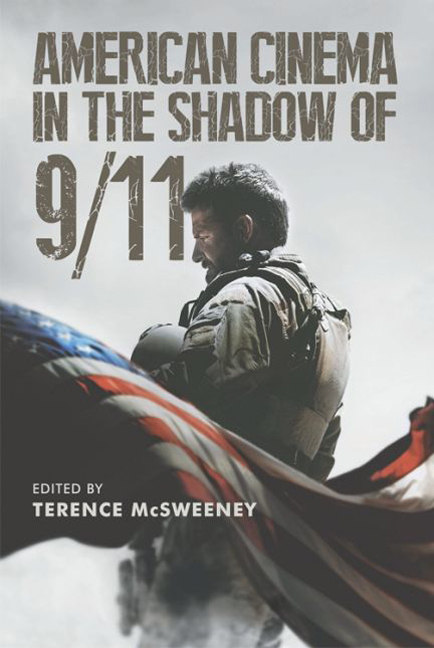Book contents
- Frontmatter
- Contents
- List of Figures
- Acknowledgements
- Foreword
- Introduction: American Cinema in the Shadow of 9/11
- Part I Dramatisations of the ‘War on Terror’
- 1 The Mythic Shape of American Sniper (2015)
- 2 Responding to Realities or Telling the Same Old Story? Mixing Real-world and Mythic Resonances in The Kingdom (2007) and Zero Dark Thirty (2012)
- 3 Acts of Redemption and ‘The Falling Man’ Photograph in Post-9/11 Us Cinema
- 4 ‘You be Very Mindful of How You Act’: Post-9/11 Culture and Arab American Subjectivities in Joseph Castelo' the War Within (2005) and Hesham Issawi' Americaneast (2008)
- 5 Refracting Fundamentalism in Mira Nair' the Reluctant Fundamentalist (2012)
- Part II Influences of the ‘War on Terror’
- Part III Allegories of the ‘War on Terror’
- Selected Filmography
- Notes on the Contributors
- Index
2 - Responding to Realities or Telling the Same Old Story? Mixing Real-world and Mythic Resonances in The Kingdom (2007) and Zero Dark Thirty (2012)
from Part I - Dramatisations of the ‘War on Terror’
Published online by Cambridge University Press: 10 May 2017
- Frontmatter
- Contents
- List of Figures
- Acknowledgements
- Foreword
- Introduction: American Cinema in the Shadow of 9/11
- Part I Dramatisations of the ‘War on Terror’
- 1 The Mythic Shape of American Sniper (2015)
- 2 Responding to Realities or Telling the Same Old Story? Mixing Real-world and Mythic Resonances in The Kingdom (2007) and Zero Dark Thirty (2012)
- 3 Acts of Redemption and ‘The Falling Man’ Photograph in Post-9/11 Us Cinema
- 4 ‘You be Very Mindful of How You Act’: Post-9/11 Culture and Arab American Subjectivities in Joseph Castelo' the War Within (2005) and Hesham Issawi' Americaneast (2008)
- 5 Refracting Fundamentalism in Mira Nair' the Reluctant Fundamentalist (2012)
- Part II Influences of the ‘War on Terror’
- Part III Allegories of the ‘War on Terror’
- Selected Filmography
- Notes on the Contributors
- Index
Summary
INTRODUCTION
To what extent do Hollywood features that dramatise aspects of the so-called ‘War on Terror’ respond in some ways to what we can understand to be the realities of the situation, either directly or in more general and approximate terms? How far, on the contrary, do they seek to impose fictional, or mythic-ideological, frameworks onto this kind of subject matter? Or, in what ways might such different approaches be combined, variously, in particular examples? This chapter addresses these questions through an analysis of two films that are in some ways contrasting but that also overlap in certain respects: The Kingdom and Zero Dark Thirty . The Kingdom begins by emphasising the real-world context of its fictional version of the response to an attack on an American oil compound in Saudi Arabia. But it then proceeds to offer an in many ways classic example of the imposition of familiar frameworks, in its evocation of a number of characteristics associated with the longstanding mythology of the American frontier – an approach that can be seen to serve a strong ideological purpose. Zero Dark Thirty also includes some such resonances, but to a much lesser extent, as a result of its greater commitment to claims to offer something closer to a reconstruction of particular real-world events relating to the hunt for, and eventual assassination of, Osama Bin Laden.
Underlying such films, I suggest, we can identify at least two, sometimes rival, imperatives. One is a desire on the part of the filmmakers (whether conceived at the level of figures such as writers and directors or of producers and studio executives) to respond to the real-world context, broadly or in more specific fashion. Another is the imperative to produce work that fits into particular Hollywood commercial routines, the nature of which can also vary. The latter include options that range between the production of recuperative fantasy – offering positive, feel-good impressions that counter any disturbing implications of a context such as the ‘War on Terror’, often including mainstream-conventional sources of action-thrills among their major attractions – and more ‘serious’ modalities that offer fewer such appeals in the process of seeking to take the moral complexities of the material more greatly on board.
- Type
- Chapter
- Information
- American Cinema in the Shadow of 9/11 , pp. 49 - 66Publisher: Edinburgh University PressPrint publication year: 2017



